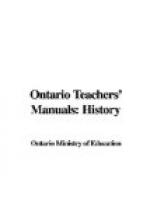Commonwealth: nominally a republic, really a dictatorship under Cromwell. He gave Britain a strong government at home, and made her respected abroad, and laid the foundations of Britain’s foreign trade and colonial empire.
Charles II: The Restoration: Reaction in state, church, and society; King striving for absolute power; Nonconformists persecuted; society profligate in its revolt against the strictness of Puritanism; Habeas Corpus Act; Test Act; Plague and Great Fire.
James II: Revolution of 1688, the death-knell
of “divine right”;
Parliament supreme; Declaration of Rights.
William and Mary: Party government—Whigs and Tories; King to act by advice of his ministers; each parliament limited to three years; Bill of Rights; Act of Settlement.
Anne: Marlborough; Union between England and
Scotland, 1707; the
Jacobites, 1715 and 1745.
George II: Walpole, the great peace minister—home and colonial trade fostered and material wealth of the nation greatly increased; Pitt, the great war minister; territorial expansion in Canada and India—Wolfe, Clive; the Methodist Movement, Wesley.
George III: The American Revolution, 1776-83: loss of the American Colonies; Pitt; Washington; acquisition of Australia by Great Britain, 1788; legislative union of Ireland with Great Britain, 1801; Napoleonic wars; Nelson, Wellington, Aboukir, Trafalgar, and Waterloo; industrial revolution—the change from an agricultural to an industrial country.
William IV: Reform Act of 1832, a great forward movement in democratic government; abolition of slavery, 1833; railways and steamships.
Victoria: First British settlement in New Zealand, 1839; Repeal of the Corn Laws, 1846—free trade, the commercial policy of England; Elementary Education Act, 1870, education compulsory; parliamentary franchise extended—vote by ballot; Crimean war; Indian Mutiny; Egypt and the Suez Canal; Boer War—Orange Free State and South African Republic annexed; social progress.
Edward VII: Irish Land Act of 1903; pensions for aged labourers; King Edward, “the Peace-maker.”
CIVICS
Taxation—direct and indirect; how the revenue of the Dominion, provinces, and municipalities, respectively, is collected.
Federal Government—Governor-general, Senate, House of Commons, Premier, Cabinet.
Imperial Government—King, House of Lords, House of Commons, Premier, Cabinet.
HISTORY
CHAPTER I
THE AIMS AND STAGES OF STUDY
AIMS
History may be made, in several ways, an important factor in forming intelligent, patriotic citizens:




